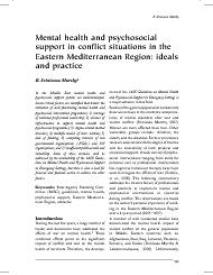Mental health and psychosocial support in conflict situations in the Eastern Mediterranean Region: ideals and practice
In the Middle East mental health and psychosocial support systems are underdeveloped. Seven criticalfactors are identified that hinder the initiation of well functioning mental health and psychosocial intervention programmes: 1) shortage of national professional leadership; 2) absence of infrastructure to support mental health and psychosocial programmes; 3) stigma around mental disorders; 4) multiple models of inter- vention; 5) lack of funding; 6) competing interests of non governmental organizations (NGOs) and UN organizations; and 7) insufficient political will and instability. Some of these obstacles will be addressed by the availability of the IASC Guidelines on Mental Health and Psychosocial Support in Emergency Settings, but there is also a need for focussed and planned action to address the other factors.
Geachte bezoeker,
De informatie die u nu opvraagt, kan door psychotraumanet niet aan u worden getoond. Dit kan verschillende redenen hebben,
waarvan (bescherming van het) auteursrecht de meeste voorkomende is. Wanneer het mogelijk is om u door te verwijzen naar de bron
van deze informatie, dan ziet u hier onder een link naar die plek.
Als er geen link staat, kunt u contact opnemen met de bibliotheek,
die u verder op weg kan helpen.
Met vriendelijke groet,
Het psychotraumanet-team.
Reference:
R. Srinivasa Murthy | 2008
In: Intervention: the international journal of mental health, psychosocial work and counselling in areas of armed conflict, ISSN 1571-8883 | 6 | 3-4 | 239-242
http://www.interventionjournal.com/sites/default/files/6.3_07_SrinivasaMurthy.pdf
In: Intervention: the international journal of mental health, psychosocial work and counselling in areas of armed conflict, ISSN 1571-8883 | 6 | 3-4 | 239-242
http://www.interventionjournal.com/sites/default/files/6.3_07_SrinivasaMurthy.pdf


